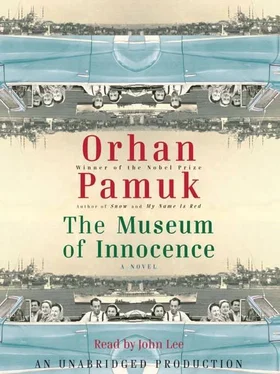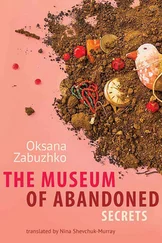“Whose is this?” asked one of the soldiers.
“It’s mine,” I said.
“What is it?”
I suddenly realized that I would be unable to say that it was a quince grater. If I did, it seemed to me they would instantly understand that I was obsessed with Füsun and had for years been visiting four or five times a week the house she shared with her family, such a hopeless and humiliating situation as to oblige them to see me as a man with strange inclinations, harboring evil. My head was foggy after an evening of clinking raki glasses with Tarık Bey, but when I think back on this episode so many years later, I do not believe this was the reason for my miscalculation. Only a few minutes earlier this quince grater had been part of the Keskins’ kitchen, and now it seemed so incongruous in the hands of this well-meaning officer from (I thought) Trabzon, that it unexpectedly sounded a deeper chord-something to do with living on this earth, and being human.
“Is this thing yours, sir?”
“Yes.”
“What is it then, brother?”
Again I fell silent, surrendering to despair-a new symptom of paralysis; I wanted this soldier, this brother of mine, to understand the wrong I had done without my telling him, but it wasn’t to be.
I’d had a classmate in primary school who was odd and rather stupid. Whenever the teacher called him up to the blackboard to ask if he’d done his math homework, he would fall silent just as I had done now, refusing to say yes or no; so weighed down was he by guilt and failure that he could only stand there, shifting his weight from one leg to the other, until the teacher went mad with fury. What I did not understand as I watched him with such amazement in that classroom was that if a person were to fall into such a silence even once, it would never again be possible for him to open his mouth; he would remain silent for years, even centuries. When I was a child, I was happy and free. But that night on Sıraselviler Avenue, so many years later, I discovered what it meant to be unable to talk. I had already had intimations that my passion for Füsun would ultimately turn into such a story of stubborn introversion. My love for her, my obsession, or whatever one could call it-it had rendered me incapable of diverting myself onto a path that would lead me to sharing this world freely with another. Even in the early days I’d known deep in my heart that mutuality could never happen in the world I’ve been describing, and so I’d turned inward, to seek Füsun there. I think that Füsun knew, too, that one day I would find her inside me. In the end everything would be fine.
“Officer, that is a grater,” said Çetin Efendi. “An ordinary quince grater.”
How had Çetin recognized the grater?
“So why couldn’t he tell me that himself?” He turned to me. “Look, we’re under martial law here… Are you deaf or what?”
“Officer, Kemal Bey is so sad these days…”
“Why is that?” asked the officer, though his job left no room for compassion. “Get back in the car and wait!” he barked. Then he walked away holding the quince grater and our identity cards.
The grater sparkled for a moment in the glare of the bright lights of the cars waiting behind us, before I saw it disappear inside the small army truck just ahead of us.
Inside the Chevrolet, Çetin and I began to wait. The closer it got to curfew, the faster people were driving by, and in the distance we saw cars racing around the corners of Taksim Square. The silence between us was further laden with the fear and guilt that I felt whenever I was searched or my card was being checked or I was simply in the presence of the police. We listened to the car clock ticking, and to keep the silence we remained perfectly still.
I imagined the grater being pawed by a captain inside the truck, and it made me uneasy. As I sat there waiting in silence, I was slowly swamped by anxiety, imagining the pain I would suffer should those soldiers confiscate the quince grater; even years later I would vividly remember how intense this anxiety was. Çetin turned on the radio. Announcers were reading out various bulletins related to the state of martial law: the wanted list, the prohibitions, the list of suspects who had been caught… I asked Çetin if he could change the station. After a bit of crackling we were able to find a more agreeable program from a distant country. As we tried to distract ourselves, a few drops of rain fell onto the windshield.
Twenty minutes after the beginning of the curfew, one of the soldiers came back and handed us our identity cards.
“It’s all settled. You can go,” he said.
“What if someone stops us for being out after the curfew?” Çetin asked.
“You can say we stopped you,” said the soldier.
Çetin started the engine. The soldier cleared the way for us. But I stepped out of the car and went over to the army truck.
“Sir, I think you still have my mother’s quince grater…”
“Now look at that, it turns out you aren’t deaf and dumb after all, and look how beautifully you speak.”
“You can’t keep this on your person, sir, it could be used as a weapon and cause serious injury!” said another soldier, one of higher rank. “But fine, take it, just be sure you don’t bring it out with you again. What line of work are you in?”
“I’m a businessman.”
“Do you pay your taxes on time?”
“I do.”
They didn’t say anything more. I’d suffered a little heartbreak, but I was glad to be reunited with the grater. As Çetin drove us home, slowly and carefully, I realized I was happy. These dark, empty streets that now belonged to Istanbul ’s dog packs, these avenues so ugly by daylight, hemmed in by concrete apartment buildings in such dreadful condition that it sapped my will just to look at them-now they looked alluringly mysterious, like poems.
IN JANUARY 1981, over lunch at Rejans, Feridun and I talked business as we drank our raki and ate our bluefish. Feridun was making commercials with Yani, a cameraman he knew from the Pelür, and while that caused me no misgivings, he was upset about doing such work “for the money.” Having observed the precocious ease with which Feridun had mastered the art of always looking comfortable and taking life’s pleasures as they came, I might at one time have found it hard to understand his moral qualms; but because suffering had caused me to mature beyond my years, I had come to realize that most people are not what they appear.
“I have a screenplay that’s ready to go,” Feridun said then. “If I’m going to work for the money, it would be better to be working on that. It’s a little crude but it has good prospects.”
It was at the Pelür Bar that I’d first heard screenplays described as “ready” or “absolutely ready” to be filmed; it meant that the screenplay had passed the board of censors or had been granted all the permissions from the state that would guarantee its safe passage. In times when very few screenplays with popular appeal passed the censors, directors and producers whose livelihood depended on making one or two films a year were prepared to shoot screenplays they’d not even considered, provided they were “ready.” Over many years of the board’s smoothing over the edges, and cutting the prickly bits out of everything that was interesting or original, films had assumed a dreary uniformity, and so for most directors it was no hardship to make a film about which they knew nothing.
“Is the plot suitable for Füsun?” I asked Feridun.
“Not in the slightest. It’s a very suggestive role, perfect for Papatya. The actress will have to wear revealing clothing, and she also has to strip. Plus the leading man has to be Tahir Tan.”
Читать дальше












